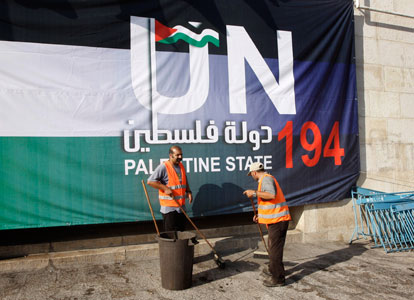![]()
Mon, Sept 19, 2011 | By Rob Harris

Palestinian municipality workers clean a street during a rally to support the Palestinian statehood bid in the United Nations. (AP Photo)
Would UN Palestinian Statehood destroy any chance of an equitable peace?
After recent suggestions that Mahmud Abbas, president of the Palestinian Authority, was wavering over a planned request for the UN to recognise a Palestinian state, he has affirmed that he will go ahead when scheduled to address the UN General Assembly on the 23rd of September. Such a move is expected to cause an environment of intensified strife.
Abbas said he wished to see a Palestinian state recognised on the basis of the 1949 Armistice Lines, which the international media incorrectly labels as the 1967 lines. This would comprise the West Bank and East Jerusalem, and Gaza, occupied by Jordan and Egypt respectively between 1948/9 and 1967. Previously these territories were administered by the Ottoman Empire and latterly the British Mandate.
Although the US is expected to veto the application for full state membership at the UN Security Council, non-member state recognition would probably pass at the UN General Assembly due to the power of the Arab/Islamic (OIC) voting block which typically gets the support of the somewhat leftist third-world Non-Aligned Movement voting bloc that represents a majority of nations within the UN, and has displayed a consistent bias against Israel.
Whether or not recognition of a Palestinian state would be inimical to the peace process, the benefits to the Palestinian cause would be significant. The Palestinian Authority is expected to get a huge majority in the General Assembly and it will appear as a significant diplomatic victory. Recognition will also aid pro-Palestinian groups. Their incessant condemnation of Israel will gain more apparent legitimacy.
UN state recognition, even where no sovereign governing body or borders exist, would allow access to other international bodies, such as the ICC (International Criminal Court), from where the notional State could sue Israel, bringing the common Palestinian lawfare tactic to a new level of intensity.
Although this Palestinian State would only exist on paper, it would still have the capacity to sign treaties with fully fledged nations, which would add to its perceived legitimacy. Many states (e.g. Arab and South American) that already adopt a strong pro-Palestinian line would queue up to offer support. This may in turn pressure the US to give it greater recognition as a full member of the UN over time.
Efforts to dissuade the request for UN state recognition
Generally speaking the path being taken by the Palestinian Authority is seen negatively by the US, the EU and some other interested parties, albeit for differing reasons.
The United States has threatened to cut off aid to the Palestinian Authority if it brings the request to the Security Council but it is unlikely for the US to do so as it would merely reinforce criticism that it display favouritism toward Israel, thus undermining their position as an honest broker in the conflict.
Although the PA have been talking about making this request for almost a year, it does not appear as if the US has attempted to form a strong coalition of allies on the Security Council against the proposal because they appear to be the only member of the Council that has stated it will exercise a veto.
There have been reservations expressed by parties on the Palestinian side too. Both Jordan and Hamas have expressed reservations but the risks to the Palestinian Authority appear to be minimal. One Hamas spokesman said that the result will be “cosmetic, especially when Mahmoud Abbas said his aim is to return to the negotiations with the occupation [i.e. Israel] after all.”
The Quartet on the Middle East, comprising of Russia, the US, EU and UN, are also seeking persuade the PA to stop the statehood bid. Tony Blair, an envoy for the Quartet, stated that they were seeking some sort of mid-way compromise:
The Palestinians are here at the UN now, so the question is … can people find a way that enables the Palestinians to take a significant step forward to statehood at the same time as not ending up in a situation where the UN replaces negotiations?
The European response has been mixed. The President of the European Parliament said the EU does not oppose such a move even if “unilateral declarations or decisions are not the best solution…” German Chancellor Angela Merkel is against recognition of a Palestinian state outside of negotiations, whilst French President Nicolas Sarkozy stated France will recognise a Palestinian state if talks are not established.
The European Union tried to avert conflict at the UN by attempting to renew talks within a short period of time but diplomats stated that the long-standing disagreements over the terms of reference prevented such a move which seems to be is diplomatic speak for Abbas refusing to return to negotiations without a suspension of construction in the settlements and Jerusalem. Since talks would or have failed to get off the ground, the EU also suggested that the Palestinians accept a lesser upgrade to their status at the United Nations. However, without any firm reason to drop the bid for full statehood, which carries richer diplomatic rewards, Abbas is unlikely to accept the offer.
In June France proposed a conference to establish parameters for a resumption of negotiations for similar reasons but was met with disinterest, for which Israel was criticised. However, Nabil Shaath, Fatah’s head of foreign relations, asserted in Lebanon that the PA would not accept the French approach of two states for two peoples.
[The French initiative] reshaped the issue of the “Jewish state” into a formula that is also unacceptable to us — two states for two peoples. They can describe Israel itself as a state for two peoples, but we will be a state for one people. The story of “two states for two peoples” means that there will be a Jewish people over there and a Palestinian people here. We will never accept this…
Dubious legal foundations
Palestine’s status at the UN is currently defined as an “entity” that has observer status with the right to speak at General Assembly meetings, participate in some votes etc.
The Palestinian position is that almost 20 years of occasional talks on statehood have hit a dead end for reasons such as Israel’s refusal to stop settlement construction s in the West Bank and East Jerusalem.
However, the path of unilateral action seems to challenge some basic principles of the peace process, including all the internationally accepted frameworks for peace, such as UN Resolutions 242 (1967) and 338 (1973), which advocate agreed solutions of the conflict rather than unilateral actions.
The Oslo Interim Agreement of 1995 (also known as Oslo II), to which both parties signed, prohibits unilateral action by either side. Article XXXI states:
Neither side shall initiate or take any step that will change the status of the West Bank and the Gaza Strip pending the outcome of the permanent status negotiations.
The PA is in breach of the agreement by demanding a suspension of settlement construction prior to resuming talks because final status issues are to be discussed directly as stated in Article XXXI. Moreover Israel’s powers in the relevant zone of its jurisdiction (Area C) weren’t limited in this regard according to Alan Baker, who assisted in negotiating and drafting the Oslo Accords:
… the two sides agreed in the 1995 Interim Agreement… on a division of their respective jurisdictions in the West Bank into areas A and B (Palestinian jurisdiction) and area C (Israeli jurisdiction). They defined the respective powers and responsibilities of each side in the areas they control. Israel’s powers and responsibilities in Area C include all aspects regarding its settlements — all this pending the outcome of the Permanent Status negotiations. This division was accepted and agreed upon by the Palestinians…
The main proponent orchestrating the settlement issue over the years has been the Palestinian leadership, which has decided to isolate and take up the issue of settlements as an independent “cause célèbre,” despite the fact that it is among the agreed-upon items to be negotiated between Israel and the Palestinians in the Permanent Status negotiations.
A common Palestinian line justifying the UN bid refers to the “1967 borders” as the just boundaries of their new state, and cite UN Security Council Resolution 242. However, the 1967 borders are in fact the armistice lines that lasted from 1949 to 1967. They were never designated as permanent boundaries by any party. Rather it was an interim cease-fire line to do expressly the opposite as Article 2.2 of the 1949 Jordanian-Israeli agreement attests:
It is also recognized that no provision of this Agreement shall in any way prejudice the rights, claims and positions of either Party hereto in the ultimate peaceful settlement of the Palestine question, the provisions of this Agreement being dictated exclusively by military considerations.
The fact that the Arab parties in the conflict insisted that the 1949 Armistice lines (Green Line) would have no political significance results in it not having the status of being a true international border. It is worthwhile to add that today many countries, for example numerous states in South America, affirm recognition of a Palestinian state on those very lines. In contrast, UN Resolution 242 (1967) recognises the present Israeli lines as borders until such time as a peace deal is achieved. 242 does not call for full withdrawal to the pre-June 1967 borders despite continual claims to the contrary. As Eugene Rostow, one of the authors of the Resolution, pointed out the wording refers to withdrawal not from “all territories” but unspecified territories whilst ensuring Israeli security. Resolutions that sought withdrawal from all territories were repeatedly rejected at the UN.
Lord Caradon, British Ambassador to the UN at the time and the primary author of Resolution 242, along with Arthur J. Goldberg, the U.S. Ambassador to the UN and another contributor to the text, both asserted that Resolution 242 did not demand Israel to return to the 1949 lines. Goldberg stated:
And it can be inferred from the incorporation of the words secure and recognized boundaries that the territorial adjustments to be made by the parties in their peace settlements could encompass less than a complete withdrawal of Israeli forces from occupied territories.
Resolution 242 also stated that all states should have “secure and recognised boundaries free from threats or acts of force”, and that only negotiation can establish such boundaries.
The mandate established by the League of Nations made it legal for Jews to settle anywhere in Palestine, which nullifies any issue of illegality over settlements if they are voluntary. Article 80 of the UN does not allow the institution to hand over any territory appertaining to the Mandate unless Israel, being the representative of the Jewish people agrees
Except as may be agreed upon in individual trusteeship agreements, made under Articles 77, 79, and 81, placing each territory under the trusteeship system, and until such agreements have been concluded, nothing in this Chapter shall be construed in or of itself to alter in any manner the rights whatsoever of any states or any peoples or the terms of existing international instruments to which Members of the United Nations may respectively be parties.
Consequently, it seems that the efforts to establish a Palestinian state at the UN may in fact be illegal.
An excellent video by Give Peace A Chance covers legality issues.
Probable effects on the Peace Process
Aside from the occasional often ill-judged initiative, the peace process initiated almost 20 years ago has in essence stalled. Whilst many pro-Palestinians pretend Israel is solely to blame for this problem the reality is different. The real issue is whether or not recognition of a Palestinian state will become an impediment to the rather faint prospect of peace down the road. The answer is a very definite “yes”.
Abbas insisted in his announcement that UN recognition would then enable the Palestinians to return to negotiations with Israel. This view seems quite absurd considering the fact that every Israeli prime minister has had an open door policy toward negotiations almost continually for two decades.
The reality is that UN recognition would give the Palestinians considerably greater power in negotiations, tipping the balance very much in their favour. Abbas more or less said so in as many words himself:
Negotiations, no matter how difficult, will be between one state and another…. But we will have obtained the world’s recognition that our state is occupied and that our land is occupied and not disputed territory, as the Israeli government claims.
Having a recognised state will dramatically reduce any incentive to compromise because Israel’s ability to trade territory in exchange for a peaceful solution will be lost. Discussion of land swaps, which were a big part of the 2000 Camp David talks, and the Olmert-Abbas talks in 2008, will also be out because the territory of this notional Palestinian State will be set in stone more so than before.
The Jerusalem Question
Critically the Palestinians would probably insist on possessing all of East Jerusalem when Arafat had agreed in principle to allowing the Jewish neighbourhoods of East Jerusalem to remain within Israel.
Any talks would also lead to a cast iron demand that the Palestinians possess the Temple Mount or Haram, which was the primary reason for Arafat walking out of Camp David over a shared sovereignty proposal. Al Jazeera and the Guardian had lambasted Abbas for even considering an independent consortium to decide the issue in the Palestine Papers controversy that they mocked up with selective leaks in January of this year to harm and perhaps destroy the PA.
Conceding absolute sovereignty to the Temple Mount and the Wailing Wall would be near impossible for Israel in the aftermath of the 1948-49 war, where the majority Jewish population was expelled from East Jerusalem, their religious sites desecrated and destroyed. Jordan banned Jews from access to East Jerusalem. That of course included the Temple Mount, which is Judaism’s holiest site, and the adjacent Wailing Wall, its last standing remnant. Indeed a few Palestinian commentators have acknowledged abandoning the site would fatally undermine the Zionist movement since Zion/Tzion equals Jerusalem.
Palestinian leaders and academics systematically deny the extraordinary historic connection between Jerusalem and the Jews. In 1967, Israel agreed to allow the Muslim Waqf to manage the Temple Mount area, with a view toward preventing religious conflict, even at the expense of Jews who are banned from worshipping at the Temple Mount itself! The considerable effort to maintain religious tolerance has never been properly recognised, and has not been remotely reciprocated. Conspiracist plots are repeatedly invented claiming that Israel seeks to harm the Al-Aqsa Mosque, as a method of incitement.
The PA has maintained the propaganda campaign that disassociates the Temple Mount from any connection with Judaism, and sources claim they intend to hand over control of the holy site to the OIC (Organisation of Islamic Co-operation).
This unfortunate contempt, which even the supposedly the moderate Palestinian Authority display, cannot give the Israeli authorities any faith that a deal respecting Jewish places of worship would be carried out in good faith by the Palestinians. For example, last month the Palestinian Authority TV channel broadcast a documentary that stated they plan to build a Palestinian residential area in place of the Western Wall Plaza in Jerusalem.
httpv://www.youtube.com/watch?v=Qkt_L7QHxiY
They [Israelis] know for certain that our [Palestinian] roots are deeper than their false history. We, from the balcony of our home, look out over [Islamic] holiness and on sin and filth [image of Jews’ praying at the Western Wall] in an area that used to have [Arab] people and homes. We are drawing our new maps. When they [Israelis] disappear from the picture, like a forgotten chapter in the pages of our city’s history, we will build it anew [a residential area]. The Mughrabi Quarter will be built here [on the Western Wall Plaza].
The Palestinian Authority has an intensely disrespectful attitude toward the connection of the Jewish faith to Jerusalem. UN recognition of a Palestinian State on pre-1967 Jordanian lines would make it considerably more difficult for Israel to ensure safety of Jewish sites and possess the right to worship at them. If Islamists like Hamas were to take a greater role, which is entirely possible, agreements would be torn up and the stance of the Palestinians toward these Jewish sites could be intensely destructive.
The effects of state recognition on the right-of-return issue
UN recognition of a Palestinian state would give a greater capacity for moral posturing if and when the PA inevitably walk away from talks since Israel will be unable to offer the so-called “right to return”.
The UNRWA, which administers the Palestinian refugees, is a remarkable institution. It is separate from UNHCR, the UN refugee agency, dedicated to aiding all other refugees in the world. In contrast to the UNHCR, the UNRWA has a uniquely liberal definition of that category, which included short-term migrant workers of which there was a substantial influx prior to Israel’s formation. Remarkably it includes the later generations of the original refugees, which has resulted in some five to six million people today.
Israel’s current population consists of almost 6 million Jews and 1.4 million Arabs. Consequently the right of return, which the PA never gave up on (contrary to Al Jazeera’s claims during the Palestine Papers controversy), would subsume the Jewish identity of the State of Israel, which was the cause of conflict with the Arab Islamic world in the first instance. Thus it is seen as an effort to destroy Israel.
Jordan has made attempts to persuade the Palestinian Authority to abandon UN recognition, based especially on Palestinian interests, by claiming that such a bid carries the risk of damaging the PA’s ability to seek the “right of return,” but with the UN decidedly on the side of the Palestinians, such an eventuality seems relatively unlikely.
Maen Areikat, the PLO emissary to the United States recently stated that a future Palestinian state should be free of Jews which mirrors a commonly held view that a Palestinian state should effctively be judenrein. The irony of this view is indeed stark. Israel absorbed most of the Jews that were expelled from the Arab world. Now it must take in not only the Jewish settlers that won’t be tolerated in a Palestinian state but six million Palestinians as well on top of the existing Arab populace!
The involvement of Hamas
State Recognition will be given to the Palestinian Authority while in a loose partnership with Hamas. This coalition government was formed in May to present a united front. However, Hamas opposes any peaceful resolution, the existence of Israel and advocates the genocide of Jews the world over. At one time there was a sharp contrast between Hamas and Fatah/PLO but this move may over time increase the radicalism within the PA, whilst increasing the creeping international legitimisation of Hamas.
Contrary to what apologists keep asserting, Hamas’ stance with regard to Israel’s existence has not softened. For example, the organisation’s foreign minister, Mahmoud Al-Zahar, asserted a month and a half ago that Hamas would view any Israeli withdrawal from the West Bank, or agreement with the Palestinian Authority, as only a ‘first stage’ towards the destruction of Israel in its entirety. Children are also a long-term component in this vision:
At this moment in time, we say to you, first of all: We want Palestine in its entirety – so there will not be any misunderstandings. If our generation is unable to achieve this, the next one will, and we are raising our children on this. Palestine means Palestine in its entirety, and Israel cannot exist in our midst.
Some conclusions
The Palestinian bid for statehood breaks numerous commitments since 1993 with the signing of the Oslo accords. Effectively Abbas is pursuing a Palestinian state without having to pay the heavy price of truly recognising Israel. Ironically enough, a Palestinian people unwilling to accept peace with Israel is the cost of decades of incitement against the state as a recent poll forcefully indicates.
It is likely but not a given that the UN General Assembly resolution will be passed because although many countries speak up for a Palestinian state based on the 1949-67 borders, numerous commentators have been saying it will lead to a great deal of Palestinian violence in the spirit of 2011 Nabka Day.
That combined with the Hamas-Fatah union, which may be a strategic error for Abbas, has given the impression that some members of the UN may be afraid of voting in a resolution that could incur a Third Intifada. Indeed it may not be a coincidence that Abbas stressed that any protests in support of the UN bid should not turn violent which would be embarrassing. It does seem likely that the endeavour will spark more conflict.
Does it really matter if UN state recognition will destroy any chance of a meaningful peace settlement? The reality certainly seems to be that the PA doesn’t seek peace, and as if to reinforce that point, Abbas said there was no alternative options the Palestinians could pursue if the bid for UN recognition ends in failure, unlikely as that will be.
There is indeed a reason that even the moderate PA has continuously denied Israel’s right to exist for example to quote one of many examples from the Al-Hayat Al-Jadida PA Newspaper:
Manal Taha, one of the organizers of the event… [said that Israel’s aim is] to threaten the resolve within the occupying entity, which continues through the actions of the authorities in Jaffa, Acre, Haifa, Jerusalem, and other occupied Palestinian cities. … Taha called upon everyone to participate in this activity, whose aim is to energize the connection between the Palestinians of the territories occupied in 1948 and [those in] the territories occupied in 1967.
Another example is a narrator in PA TV broadcast addressing Israelis, and asking them to leave, because Israel has no right to exist:
httpv://www.youtube.com/watch?v=4XcA9lGkRa8
Where are you [Israelis] from? Where are you from? Where are you from? Of course, you’re from Ukraine; of course, you’re from Germany, from Poland, from Russia, from Ethiopia, the Falasha (pejorative for Ethiopian Jews). Why have you stolen my homeland and taken my place? Please, I ask of you, return to your original homeland, so that I can return to my original homeland. This is my homeland; go back to your homeland!
Israel, the US and other sectors of the international community are opposed to the Palestinian move at the UN. The truth remains that a true Palestinian state can only be created through direct negotiations.
The founding a Palestinian state is not remotely the root issue of the conflict. The idea has been fully accepted by Israel subject to the negotiations process. Peace is the issue and it will only come with a mutual recognition of each party’s conflicting rights. UN recognition would ignore Israel’s concerns over security, and recognition by its long standing opponent as the national home of the Jewish people. Thus this one-sided UN bid will simply snuff out an already extremely fragile movement toward peace.
Ps. Aish offers a humorous account of the UN bid.
Rob Harris contributes articles to several websites on music, certain areas of technology, and contentious political issues (not to be confused with the popular English novelist (1957-) of the same name). He blogs at eirael.blogspot.com. He lives in Ireland.



 RSS
RSS










I ask one question on Jerusalem-
Tell me where and in which verse the name Jerusalem appears in the Q`ran- In any form or language?
Steve, the Koran doesn’t mention Jerusalem in any form. Daniel Pipes offered a million dollars a while back to find any mention of it. The Koran (Sura 17) mentions the al Aqsa Mosque which merely means the Further Mosque, nearby which Mohammad ascended to Heaven. People interpreted it as a metaphor because it is related to a dream he had. At the time Muslims appear to have called Jerusalem Bayt al-Maqewdis which means Holy Temple, clearly a reference to the remains on the Temple Mount. The Umayyid Empire had lost control of Mecca and are believed to have invented in the late 7th Century the notion the al Aqsa mosque in Mohammad’s dream was actually located in Jerusalem, probably as a way of deflecting some of Mecca’s primacy in the faith. That may be why they began building the Dome on the Rock structure in 688 AD, fifty years after they had taken over Jerusalem (638) and also built the grand al Aqsa mosque to replace the primitive one on the site.
Exactly-
So when we hear people talk of Jerusalem being a spiritual place for Muslims, it simply is not so!
Whist there is no contradiction that it is holy to Hebrews and Christians-
The Muslim places are Mecca and Medina and thats the way Muslims face when praying, their backs to Jerusalem!
Very true, Jerusalem is important to Islam but if one strips the old politics that tried to big the place up then it would come a very distant third after Christianity and especially Judaism. It is significant that the Christian crusaders and Israel were the only two to actually make it a capital. A little known fact is that when Islam came to Palestine, Ramla was the administrative capital. I hope to finish an article about the above soon.